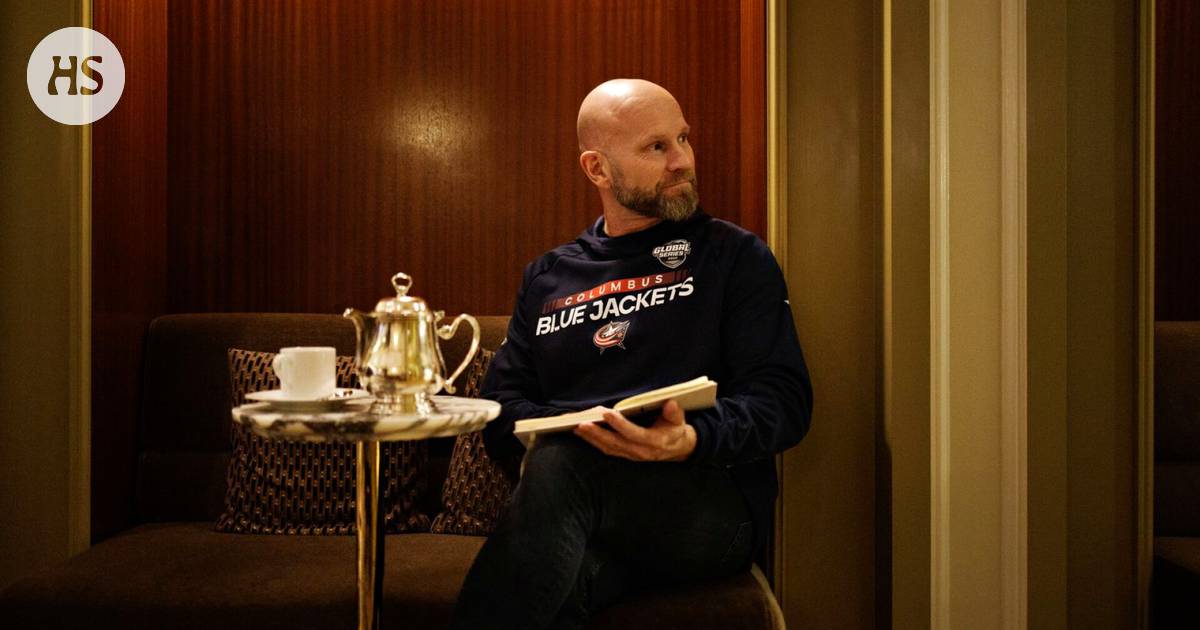For years, the NHL club Columbus Bluejackets has cooperated with the renowned sleep doctor Henri Tuomilehto in order to get the players to recover better from stress.
Sleep doctor Henri Tuomilehto is trying to improve the sleeping skills of the players of the NHL club Columbus Bluejackets.
This is an important issue. With better sleep, players earning millions of dollars are guaranteed better recovery from stress, a more positive mind and better energy.
Columbus and Colorado will meet in Tampere in two NHL regular season games on Friday and Saturday.
The timing is difficult. The Ice Hockey League’s NHL Regular Series has had time to run around ten rounds in North America, when the long flight and the 7-8 hour time difference will mix up the rhythm.
In addition to everything, the direction of travel from the United States to Finland is harder on the body than the other way around.
“Physiologically, it takes longer to recover in the east,” says Tuomilehto in the coffee shop at Hotel Kämpi.
Both teams arrived in Helsinki on Monday and spent the first days balancing the jet lag, i.e. the time difference stress, until the series points start to be distributed in the Nokia Arena.
“
“Jet lag is physiology and you can’t fake it.”
Tuomilehto, 54, is in his fourth year on the Columbus payroll and helps players sleep better and understand the meaning of sleep.
“I can’t promise the Stanley Cup, but at least this awareness of dreams is not an obstacle to winning.”
Bluejackets lived in Kämpi during the first days of their visit to Finland. Tuomilehto joined the team on Tuesday for breakfast.
On Monday, i.e. the day of arrival, he calmed the players down completely, but was pleased to find that everything was done as well as possible.
Columbus played last Sunday against New Jersey, flew at night and arrived in Helsinki on Monday morning around 11 o’clock. After that, the club’s coaching management organized a light program for the whole day. There was everything possible, from football and a little sweat to a joint dinner.
Bed and sleeping were out of the question.
“Monday was textbook-like. It was a really great bet from the club’s management.”
Tuomilehto says that the worst mistake would have been to go to bed on the morning of the arrival day. It could have ruined many days to come, even a whole week.
“Jet lag is physiology and you can’t fake it.”
“
“The brain starts to compensate for the lack of sleep, and then you have to give the brain a chance.”
Nap after arriving in the country at the wrong time would be an intermediate prize, but the wrong solution in that regard.
“The recovery would then go off on the wrong track,” Tuomilehto estimates.
He met with the Columbus team last Thursday via Zoom video connection. He gave a lecture and gave briefings before the trip to Finland.
One instruction was to try to wake up a little earlier than usual on the last couple of days on the US East Coast. It would move the internal clock a small step towards Finnish time.
The rest of the hours that mess up the body should be taken care of in the fewest installments.
When Tuomilehto met the team on Tuesday at the hotel breakfast, most praised how well the night had gone. And if the night didn’t go well, you shouldn’t worry.
“The brain starts to compensate for the lack of sleep, and then you have to give the brain a chance.”
Tuomilehto gives an example. While it might normally take around 30 minutes to fall into a deep sleep, a tired person can reach it in 10-15 minutes. The brain starts to fix the lack of sleep.
Columbus sports director Jarmo Kekäläinen watched the World Cup tournament in Tampere in the spring, and now he brought his club to two NHL games.
of Columbus and Tuomilehto’s first contacts were in the summer of 2018. The club’s sports director Jarmo Kekäläinen contacted Tuomilehto. Kekäläinen was interested in the meaning of the dream and asked Tuomilehto to his summer place to tell more.
Tuomilehto gave a two-hour monologue about what he thought about athletes’ sleep and how it should be studied and clarified.
After the performance, Tuomilehto shook hands with the listeners. That would be it, he thought.
Two weeks later the phone rang. Kekäläinen invited the sleep doctor to Columbus before the start of the NHL season.
Tuomilehto took his sleep technician with him and set off. They also packed sleep study devices that provide official and accurate data on the quality and depth of sleep.
The meeting with the Columbus players started again with a long speech. Tuomilehto told and explained the importance of sleep in elite sports.
The club’s coaching management thought at that stage that 5–7 players might be interested in finding out their own sleeping level.
“
“The players had been able to extend their sleep time by an hour on average. It spoke of commitment.”
Eventually 20 players wanted to take part in the test. The harshest results revealed that a few of them suffered from sleep disorders.
“If you want to study a dream, there’s no other way to find out than by putting the sheets on. It can’t be done with any watches or rings. They are just wellness products,” says Tuomilehto.
The research resulted in the players getting an individualized plan for their sleep and recovery.
Tuomilehto reminds us that sleeping is a skill and skills can be developed. So did Columbus.
There was another important thing. A dream cannot be fulfilled, i.e. forced. It just has to be given a chance to come at the right time.
Later in the same season, Tuomilehto participated in the team’s away tour in Florida and Tampa. The lessons had sunk in and the knowledge had helped.
“The players had been able to extend their sleep time by an hour on average. It spoke of commitment.”
“
“Two-hour naps destroy the quality of night sleep. Daytime naps cannot compensate for nighttime sleep.”
In cooperation With the Bluejackets, Tuomilehto wants to be as approachable as possible. The former quality domestic squash player walks around the hotel wearing a Columbus hoodie, and there is no sign of a stiff doctor look.
He gives the players instructions, educates and helps if they need support. It is important to be available all the time.
The players learned and understood that jet lag is not caused by naps. Naps are still not forbidden when the moment is right and we are in the right rhythm.
Tuomilehto knows that the players need their naps, but he has had to face one misconception.
In locker room talks, there are stories about one-hour, one-and-a-half, even two-hour hijinks. There are beliefs about sleep and sleeping, teachings of lifestyle coaches, tips from experience experts and a lot of other stuff.
“They have nothing to do with science. There was a ruckus when I told them about the length of the nap. The players are critical, and you have to justify things to them.”
Tuomilehto recommends the maximum length of naps be half an hour, no more.
“Two-hour naps destroy the quality of night sleep. Daytime naps cannot compensate for nighttime sleep.”
Read more: A sleep researcher caught up with Mikael Granlund and found out what goes on in his head at night – The star striker’s brain rattled when he should have already fallen into a deep sleep
Read more: Henri Tuomilehto, a sleep doctor who knows Mikael Granlund well, emphasizes one thing about playing under strain – this is how he responds to critics
Columbus and Colorado will meet on Friday and Saturday in Tampere’s Nokia Arena at 20:05. TV2 and V Sport Suomi will show both matches live.
#Sleep #Sleep #doctor #Henri #Tuomilehto #criticizes #tenacious #delusion #lives #dressing #rooms #destroys #nights #sleep

/https://content.production.cdn.art19.com/images/6e/20/75/47/6e207547-4ad6-4811-b8f0-3c7b7a3edb51/0b845a2013df296da2e006375909e160f8cc4c964755dc820563b9006df775)







